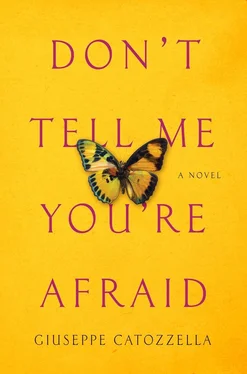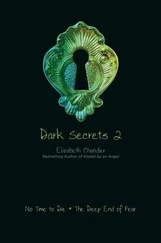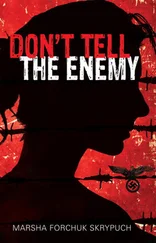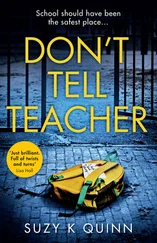Shhhh. Shhhh .
We moved closer and dipped our hands and feet in the water. I stuck my fingers in my mouth. Salty.
That night, after that approach, I dreamed about waves. I dreamed of losing myself in that vastness, letting it cradle me, drifting up and down according to the water’s mood.
Well, war, as I said, took the sea away from me. But on the other hand, it made me want to run. Because my desire to run is as deep as the sea. Running is my sea.
In any case, if Alì and I always pretended that the war didn’t exist, it’s because we were the children of Yusuf Omar, my father, and Yassin Ahmed, Alì’s father. They too have been friends since the day they were born, and they too grew up together in the village of Jazeera, south of the city. They attended the same school and their fathers also worked together, in the period of the Italian colonists. Together our two fathers learned some proverbs in that language from their two fathers. Non fare oggi quello che puoi fare domani, “Don’t do today what you can do tomorrow.” And Tutto il mondo è paese, “The world is the same wherever you go.”
Aiutati che Dio t’aiuta, “God helps those who help themselves.”
Another saying they learned from them is Cascassero sulla tua testa mille chili di merda molle molle, “May a thousand pounds of runny shit fall on your head,” with all its variants, which was a phrase their fathers’ Italian boss always used to say, back when they worked at the port, unloading containers. One day a container packed with manure had suddenly opened up and the boss had been inundated by that “rain” from above. Since then things had gone very well for him, but even so he’d started using that expression whenever he felt like swearing.
Another proverb said, Siamo tutti figli della stessa patria, “We’re all children of the same country.” This one is a favorite of Aabe and Yassin: best friends whom nothing will ever come between.
Like us.
“Can anything ever break us apart?” Alì and I wondered on those sweltering, brutally hot afternoons when he helped me climb the eucalyptus and we took shelter in the coolness of the leaves for half a day, talking about the future. Staying up there in the eucalyptus was wonderful; in place of the real world, we concocted one in which only we two and our dreams existed.
“No!” we told each other in turn. And then we made the gesture swearing to be blood brothers: We kissed our linked index fingers in front of our mouths twice, reversing right and left. Nothing and no one could come between us. We would have bet anything, even our lives.
But that eucalyptus was also Alì’s favorite spot where he went to hide by himself. For example, in the afternoon when he didn’t want to learn to read.
Although Hodan was five years older than me, in fact, every morning she and I went to school together, to the Madrasa Musjma Institute, a district comprising primary, middle, and secondary classes. Alì didn’t come with us; his father never had the money to allow him to study. He attended first grade at the public institution, but then the school was destroyed by a grenade and he hasn’t gone back since then. After that unhappy day classes were held outdoors, and it wasn’t easy to find teachers willing to risk a bomb on their heads.
The only way to learn was to enroll at the private school. Our father was able to afford it for a few years, thanks to many sacrifices, whereas since the beginning of the war Yassin has always had trouble selling his fruit and vegetables.
In Mogadishu it was said that few people wanted to buy from a filthy Darod.
Alì has always been touchy about the fact that we knew how to read and write. It made him feel inferior. His clan was in effect viewed that way in our neighborhood, and that was one of the things that proved it.
Every now and then we tried to teach him the letters of the alphabet, but after a while we gave up.
“Alì, try to focus,” Hodan told him; she’s always had a tendency to act like a schoolmarm, a little mother.
He tried hard, but it was too difficult. Learning to read was a long process; you couldn’t attempt it in the afternoon, sitting in the courtyard at a small table that Aabe and Yassin used for playing cards, under a sun that was still hot and made you want only to have fun. The only one who experienced anything like fun was Hodan, who played the teacher and made me and Alì be her pupils. I was always the good student, and he was the one who didn’t pay attention.
“I can’t,” Alì would say. “It’s too hard. Besides, I don’t care about learning! Being able to read is useless!”
I had to play the part of the schoolmate who wanted to help him; otherwise Hodan would get mad. “Come on, Alì. It’s not so difficult; even I learned how. Look, these are the vowels: a, e, i, o…” I tried to encourage him.
He’d run away. It was hopeless. He’d stick it out for ten minutes until Hodan, at the beginning of the class, started reading a passage from a book. When it was his turn to try to read, he made up any excuse to disappear. Those times, when Hodan insisted and made him angry, Alì would climb the eucalyptus and stay there.
His eucalyptus. His favorite spot.
One afternoon, after arguing with his brother Nassir, he climbed up to the top and stayed there for almost two days. No one was able to get him to come down; no one else could climb all the way up there. Nassir tried every way he could to persuade him, but there was no way. Alì came down only the second night, weakened by hunger.
After that we started calling him “monkey.” Only a monkey like him could make it up there to the top. He’d rather be called that than learn how to read.
Anyway, Alì always acted uppity, but he was slower than me, even if he was a boy. He was stronger — if we fought he beat me — but he was slower.
When he wanted to make me angry, he said I was a wiilo, a tomboy, and that was the only reason I ran so fast. He said I was a boy who’d been born in the body of a girl, that I was a know-it-all snot nose just like the boys, and that when I got big I’d grow whiskers like his father, Aabe Yassin. I knew it; there was no need for him to tell me: I knew I was a tomboy and that when people saw me running without veils, without the qamar and the hijab, wearing only shorts and a T-shirt bigger than I was, since I was thinner than an olive branch, they thought that I was not a perfect daughter of the Koran.
But in the evening, after supper, when the adults enjoyed making us compete in the courtyard for a scoop of sweet sesame paste or a chocolate angero, a crepe, I showed him. The courtyard was the center of life for all families; with the war it was best to leave the house as infrequently as possible.
After Hooyo Dahabo, with the help of my sisters, had cooked supper for everyone on the burgico, the brazier as big as a whole cow, and after we had finished eating what there was — usually bread and vegetables or rice and potatoes, and every once in a while a little meat — Aabe Yusuf and Aabe Yassin prepared the track for us.
Our older brothers and sisters cheered while Alì and I, posed like champions, bent over at the starting line, crouching down with our hands on the ground. We even had starting blocks, which Aabe had built by taking apart two wooden watermelon crates.
For the lines that marked the lanes, Said and Nassir, our older brothers, had to drag their feet from the end of the courtyard to the earthen wall, about thirty meters, outlining a turnaround and tracing a course back to the starting point.
I always won.
Alì hated me, but in the end I almost always shared the thing I love most in the world, my sweet sesame, with him — there’s nothing I love more than sweet sesame paste. But first I’d make him promise not to call me wiilo anymore. If he agreed, I gave him half.
Читать дальше




![Ally Carter - [Gallagher Girls 01] I'd Tell You I Love You But Then I'd Have to Kill You](/books/262179/ally-carter-gallagher-girls-01-i-d-tell-you-i-lo-thumb.webp)







